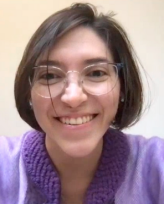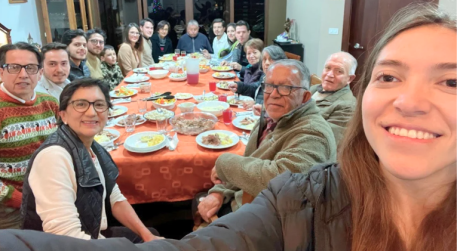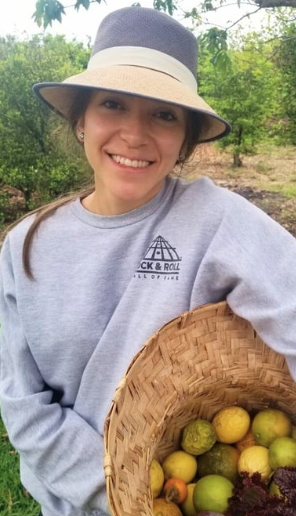DLMP Heritage Appreciation - Hispanic Heritage Month
September 11, 2025
View this article as a PDF or view this article as an accessible document optimized for screen readers.

Interview by Melanie Shears, PhD
Dr. Maria (Paz) Gray is a fourth year Resident in the Anatomic & Clinical Pathology track at the DLMP. She is a proud Ecuadorian and undertook her medical training at Universidad del Azuay Facultad de Medicina, Ecuador. To provide more avenues for international medical graduates at the DLMP, Paz created the International Medical Graduate Observership Program. The program is a one-month observational opportunity for international medical graduates to observe DLMP physicians, residents and fellows in practice.

We had the pleasure of interviewing Paz for our Hispanic Heritage Month celebration and learning about her personal journey.
Melanie: Thanks for volunteering to speak with me. Could you introduce yourself and tell me about your work?
Paz: Sure! I lived my entire life in Ecuador until I was maybe 24 or 25, when I graduated from medical school. Then I moved to the US. I’m now in my final year of Residency in Pathology at UW.
Melanie: Tell me about your journey into Pathology. What made you choose it as a field of study?
Paz: In Ecuador, Pathology wasn't my favorite at first—it’s taught as a very tough, intimidating course meant to filter students, so nobody enjoyed it initially. My perspective changed when I studied for the medical board exams in Miami and discovered Dr. Sattar’s pathology materials, which I found fascinating. Later, I also met inspiring pathologists like Dr. Araceli Palta and Dr. Tom Brucker, who were wonderful mentors and made me love the field even more.
Melanie: Thank you for that introduction. Let's shift a little now to representation. Were there others in your residency who were Ecuadorian or Hispanic, or who you felt a connection with?
Paz: It was tough. When I was studying for the medical board exams in Miami, I had a close group of Latin friends, and we’d play soccer or go dancing—it was a strong sense of community. I was used to being part of a community where I shared jokes and backgrounds with others. After moving to Seattle, I haven’t met any other Ecuadorians. There are very few Latin people in my residency. I realized that very few people here speak English as a second language. Sometimes, I have felt hesitant to ask questions or missed out on jokes due to language and cultural differences. Not having a community here has been challenging.
Melanie: Can you tell me how you think our Department could be more engaged with the issues of representation?
Paz: I'm proud to have helped start an Observership Program for International Medical Graduates. Right now, we only accept one person a year, but I hope it expands so more people from Latin or other backgrounds can see what Pathology training is like here.
When I first arrived, this kind of program would have helped me a lot. These observerships let International Medical Graduates experience the training firsthand. They also show residency programs the enthusiasm and dedication we bring. I also believe that as residency programs see our determination, they’ll be more open to recruiting internationally.
❝ The Observership Program lets International Medical Graduates experience Pathology training firsthand and shows how the Residency Program much energy and determination we bring. ❞
Melanie: Can you share a little about Ecuadorian culture?
Paz: Ecuadorian culture is very warm, loud, and happy. Family is the most important thing. We find any excuse to get together—birthdays, Christmas, Carnival, when someone is traveling, anything. We spend the whole day with family, making and sharing food. It’s not always about having the best or fanciest food—except Carnival, when the food really is amazing.
You’re born with a support system; your cousins and relatives are there for you from the beginning, whether it’s fighting as kids or joking around. That bond lasts a lifetime.
My friends from Ecuador are like family to me too. Back home, you often go to the same school from age three or four until you graduate at eighteen. My brother went to the same high school as my uncles and grandfather, and I attended the same school where my mom went. So those friends become part of your lifelong network and support system. Whenever I visit Ecuador, I always make time to see them—even if it’s just once or twice during that week.
Melanie: It sounds like you have an amazing network of people that love you.
Paz: Exactly! It’s all about having that support system. Whenever one of my cousins, my brother, or anyone needs me, they can reach out and I’ll always make time for them. It goes both ways—sometimes I call my family while they’re driving, and they'll just listen to me. That’s really what I want my children to have, that sense of belonging and connection.
Melanie: Earlier you talked about the food at Carnival. Please tell me more!
Paz: Carnival is a big deal for us. We gather with family and celebrate for three days, from early morning to late afternoon. It’s not just about eating—it’s about preparing the food together with family.
My mom bakes bread, and we make manjar, which is similar to dulce de leche. We’ll use figs from our tree to make a dessert called dulce de higo, and sometimes we make dulce de durazno with peaches. There are always so many potatoes and mote, which is a large, savory corn. There is also pig. You can hire people to help, or do it yourself. The food just keeps coming.
Carnival in Ecuador isn’t like in Brazil with the famous parades. Instead, our tradition is to throw water at each other. You’ll see people in the streets tossing water, flour, sugar, and sometimes even pig’s blood. It can just go crazy.
Melanie: That sounds amazing. And in the context of this big family and this wonderful community that you've described, that sounds like a lot of fun.
Paz: I have a four month old baby right now and so I cannot wait for him to start playing and going to carnival.
Melanie: Of course.
❝ I’m just very proud of my culture. I am proud of who I am and where I’m from. I wouldn’t change a thing. It’s been tough—it’s been a hard path to get to where I am right now—but I wouldn’t change a single thing about my background. I’m very happy and feel blessed with who I am, where I’m from, and where I am now. ❞
Upcoming Heritage Celebrations
- Hindu Heritage Month: October
- Honors the cultural, spiritual, and historical contributions of the Hindu community and Hinduism as a religion
- Polish American Month: October
- Recognizes the contributions of Polish people and their descendants to American history and culture.
- Filipino American Month: October
- Honors the history, accomplishments, and legacy of Filipinos and Filipino Americans in the United States.
Would you like to be featured in an upcoming article? Email us!
- Melanie Shears (mshears@uw.edu)
- Nicole Jackson (nicjack@uw.edu)